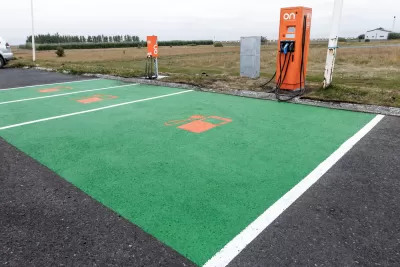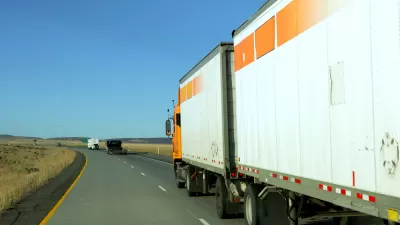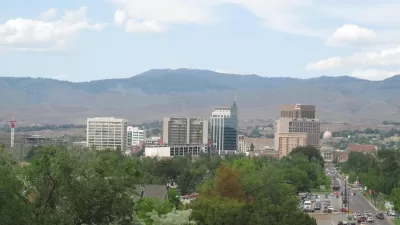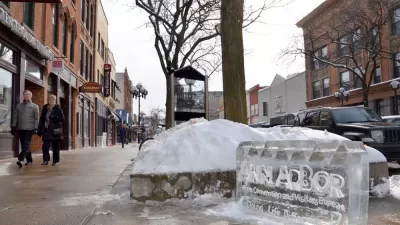Iceland is thinking ahead when it comes to revenue losses resulting from its newly adopted "Climate Strategy" that calls for ending petrol-powered, fuel tax-paying motor vehicles by 2030. Widespread electronic road tolls are being considered.

"The idea to implement widespread road tolls was part of a bill introduced to parliament in December," reports Larissa Kyzer from Iceland.
Developed by the Parliamentary Environmental and Communications Committee in close consultation with Minister of Transportation, Sigurður Ingi Jóhannsson, the planned tolls are meant to offset a loss of income from gas and diesel taxes, which are expected to fall rapidly over the next few years due to the government’s environmental action plan.
The tolls would not be collected via booths; rather, cameras installed at specific toll points along the road would record license plate numbers and charge drivers electronically. The hope is that the camera tolls would not disrupt the flow of traffic. [See "electronic toll collection."]
The new measures in the Climate Strategy "are to help Iceland meet its Paris Agreement targets for 2030 and reach the government‘s ambitious aim to make Iceland carbon neutral before 2040," according to the Sept. 10, 2018 announcement last September by Prime Minister Katrín Jakobsdóttir.
The Strategy consists of 34 Government measures, ranging from an increase in reforestation to a ban on new registration of fossil fuel cars by 2030. The plan aims at transforming the transportation system from using imported fossil fuels to a carbon-free system run on renewable energy.
Unlike most nations, Iceland's power generation comes mainly from two forms of renewable energy: hydroelectric and geothermal. Industrial processes, "mainly from aluminium and ferrosilicon production," make up 42 percent of greenhouse gas emissions, according to the Ministry for the Environment and Natural Resources. The second largest source is road transport at 20 percent. [See pie chart, "GHG Emissions 2016" on pg. 3, Iceland’s Climate Action Plan for 2018-2030 [pdf].
In addition to the aforementioned legislation, widespread road tolling throughout the nation has the support of Bergþóra Þorkelsdóttir, Director of the Icelandic Road and Coastal Administration, adds Kyzer.
“…[I]t’s just my personal opinion,” she remarked in an interview on a morning radio program, “[but] I have a hard time seeing how a 350,000-person population in a country this big would ever be able to build up the [road] system without taking in any kind of funds, like road tolls or something of that nature, such that our guests are participating in the financing of it in some way.”
In a separate article published Jan. 27 on declining petrol prices, Kyzer describes the government's taxation of fuel, which presumably would have to be replaced by road tolling and other sources.
The Icelandic state takes a portion of the profits from each litre of petrol sold. Thus, in 2018, 20.46% of the cost of petrol went toward a special petrol tax, 12.69% went to general petrol tax, and 3.83% went to a carbon tax. Lastly, 19.35% of the sale price is VAT.
All combined, 121.39 krónur from every litre of gas sold went to the Icelandic government in 2018, or 56.33%. The highest that the government’s take has reached is 60.26% in July 2017.
On Jan. 15, a liter of gasoline cost 216 krónur, or $1.81, which is about $6.85 per gallon.
Hat tip to IBTTA Smart Brief.
FULL STORY: Director of Road Administration in Favour of Tolls

Alabama: Trump Terminates Settlements for Black Communities Harmed By Raw Sewage
Trump deemed the landmark civil rights agreement “illegal DEI and environmental justice policy.”

Study: Maui’s Plan to Convert Vacation Rentals to Long-Term Housing Could Cause Nearly $1 Billion Economic Loss
The plan would reduce visitor accommodation by 25% resulting in 1,900 jobs lost.

Planetizen Federal Action Tracker
A weekly monitor of how Trump’s orders and actions are impacting planners and planning in America.

Wind Energy on the Rise Despite Federal Policy Reversal
The Trump administration is revoking federal support for renewable energy, but demand for new projects continues unabated.

Passengers Flock to Caltrain After Electrification
The new electric trains are running faster and more reliably, leading to strong ridership growth on the Bay Area rail system.

Texas Churches Rally Behind ‘Yes in God’s Back Yard’ Legislation
Religious leaders want the state to reduce zoning regulations to streamline leasing church-owned land to housing developers.
Urban Design for Planners 1: Software Tools
This six-course series explores essential urban design concepts using open source software and equips planners with the tools they need to participate fully in the urban design process.
Planning for Universal Design
Learn the tools for implementing Universal Design in planning regulations.
Caltrans
Smith Gee Studio
Institute for Housing and Urban Development Studies (IHS)
City of Grandview
Harvard GSD Executive Education
Toledo-Lucas County Plan Commissions
Salt Lake City
NYU Wagner Graduate School of Public Service





























